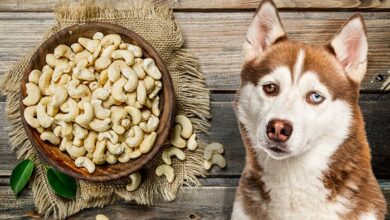Can Dogs Eat Miso Soup? Safe or Dangerous at 2024

Can dogs eat miso soup? Miso soup is a traditional Japanese dish with a savory flavor, made from miso paste, dashi broth, tofu, seaweed, and green onions. It’s popular for its nutritional benefits and unique taste.
But can dogs eat miso soup safely? While this soup is healthy and delicious for humans, it’s important to consider whether it’s suitable for your furry friend. Let’s explore the common myths and facts about feeding miso soup to dogs and clear up any confusion. So let’s discuss whether can dogs eat miso soup or not.

Can Dogs Eat Miso Soup?
Miso soup, a traditional Japanese dish, is celebrated for its rich nutritional profile and potential health benefits. This savory soup, made from fermented soybeans, offers a variety of essential nutrients that can contribute to overall well-being. However, when considering if can dogs eat miso soup, it’s crucial to understand both the potential benefits and risks associated with its ingredients.
Nutritional Benefits of Miso Soup
Rich in Protein from Fermented Soybeans
- High Protein Content: Miso soup is an excellent source of protein, primarily derived from fermented soybeans. Protein is essential for muscle development, tissue repair, and various metabolic processes.
- Amino Acids: The fermentation process enhances the availability of essential amino acids, making miso a complete protein source.
Contains Probiotics Beneficial for Gut Health
- Probiotics: The fermentation process used to produce miso results in the presence of beneficial bacteria known as probiotics. These probiotics can aid in maintaining a healthy gut flora, improving digestion, and boosting the immune system.
- Digestive Health: Regular consumption of probiotic-rich foods like miso soup can help prevent digestive disorders and promote a balanced intestinal environment.
Provides Essential Vitamins and Minerals
- B Vitamins: Miso soup is rich in B vitamins, including B12, which are crucial for energy production, brain function, and the maintenance of healthy skin and eyes.
- Manganese: This essential mineral found in miso soup plays a significant role in bone formation, blood clotting, and reducing inflammation.
- Other Nutrients: Miso soup also contains other important nutrients such as vitamin K, copper, zinc, and dietary fiber.
Considerations for Dogs
can dogs eat miso soup? While the nutritional benefits of miso soup are clear for humans, it’s important to consider whether these benefits translate to dogs.
- Sodium Content: One of the primary concerns with feeding miso soup to dogs is its high sodium content. Excessive sodium intake can lead to health issues such as hypertension and kidney problems in dogs.
- Soy Allergies: Some dogs may have allergies or sensitivities to soy products. Introducing miso soup to their diet could result in adverse reactions.
- Additives and Ingredients: Miso soup often contains additional ingredients such as onions and garlic, which are toxic to dogs. Always ensure that any food given to pets is free from harmful additives.
can dogs eat miso soup? While miso soup offers numerous nutritional benefits for humans, it is not an ideal food for dogs due to its high sodium content and the potential presence of harmful ingredients. It’s always best to consult with a veterinarian before introducing any new foods into your dog’s diet.
Potential Dangers of Miso Soup for Dogs
can dogs eat miso soup? Miso soup, a traditional and nutritious Japanese dish, is known for its beneficial properties for humans. However, when it comes to our canine companions, certain aspects of miso soup can pose significant health risks. Understanding these potential dangers is crucial for ensuring the safety and well-being of dogs.
High Sodium Content Can Lead to Salt Poisoning
- Excessive Sodium: Miso soup contains high levels of sodium, which can be harmful to dogs.
- Salt Poisoning: Consumption of too much sodium can lead to salt poisoning in dogs, causing symptoms such as vomiting, diarrhea, seizures, and even death in severe cases.
- Kidney Strain: High sodium intake can also strain a dog’s kidneys, potentially leading to chronic kidney disease over time.
Onions and Garlic, Often Included, Are Toxic to Dogs
- Onions: Onions are a common ingredient in many miso soup recipes. They contain compounds that are toxic to dogs, leading to the destruction of red blood cells and causing anemia.
- Garlic: Similar to onions, garlic is also toxic to dogs. Even small amounts can cause gastrointestinal upset and damage to red blood cells.
- Cumulative Effect: The toxic effects of onions and garlic can be cumulative, meaning even small amounts consumed over time can lead to serious health issues.
Fermented Ingredients May Cause Digestive Upset
- Fermentation: While fermented ingredients like those found in miso can be beneficial for human digestion, they may not be as well-tolerated by dogs.
- Digestive Upset: The unique composition of fermented foods can lead to digestive upset in dogs, including symptoms like bloating, gas, and diarrhea.
- Probiotic Sensitivity: Some dogs may be sensitive to the probiotics found in fermented foods, which can disrupt their normal gut flora and lead to further digestive issues.
can dogs eat miso soup? While miso soup offers numerous health benefits for humans, it can pose several dangers to dogs. The high sodium content, presence of toxic ingredients like onions and garlic, and potential for digestive upset make it an unsuitable choice for canine consumption. Always consult with a veterinarian before introducing any new foods into your dog’s diet to ensure their safety and health.
Signs of Sodium Toxicity in Dogs
can dogs eat miso soup? Miso soup, a savory and nutrient-rich Japanese dish, is often enjoyed by humans for its health benefits. However, when it comes to dogs, there are significant concerns about its safety due to certain ingredients and nutritional content. One major risk is sodium toxicity, which can be particularly harmful to dogs.
Vomiting and Diarrhea
- Initial Symptoms: One of the earliest signs of sodium toxicity in dogs is gastrointestinal distress.
- Vomiting: Dogs may begin to vomit shortly after ingesting a large amount of sodium.
- Diarrhea: Diarrhea often accompanies vomiting, further contributing to dehydration and electrolyte imbalance.
Excessive Thirst and Urination
- Increased Thirst: Dogs with sodium toxicity will exhibit excessive thirst as their bodies attempt to flush out the excess salt.
- Frequent Urination: This increased water intake leads to frequent urination, which can exacerbate dehydration if not properly managed.
Lethargy and Lack of Coordination
- Energy Levels: Sodium toxicity can cause a significant drop in energy levels, resulting in lethargy.
- Motor Skills: Affected dogs may show a lack of coordination, appearing unsteady or disoriented.
- Severe Cases: Tremors, Seizures, and Coma
- Advanced Symptoms: In severe cases, the neurological impact of sodium toxicity can lead to more dramatic symptoms.
- Tremors: Dogs may experience involuntary muscle tremors.
- Seizures: Seizures can occur as the toxicity affects the central nervous system.
- Coma: In the most severe instances, sodium toxicity can lead to coma and potentially be fatal if not treated promptly.
can dogs eat miso soup? Understanding these signs is crucial for pet owners in recognizing and responding to potential sodium toxicity. Given these risks, it is clear that dogs should avoid miso soup and other high-sodium foods. Always consult a veterinarian if you suspect your dog has ingested a harmful amount of sodium or any other toxic substance.
Vet Recommendations: Should Dogs Eat Miso Soup?
can dogs eat miso soup? Miso soup, a beloved and nutrient-rich dish in Japanese cuisine, offers various health benefits for humans. However, its suitability for dogs is a matter of concern due to certain ingredients and nutritional content. Veterinarians generally advise against feeding miso soup to dogs because of potential health risks.
Generally Not Recommended Due to Potential Health Risks
- High Sodium Content: Miso soup contains high levels of sodium, which can lead to sodium toxicity in dogs. Symptoms include vomiting, diarrhea, excessive thirst, lethargy, and in severe cases, tremors, seizures, and coma.
- Toxic Ingredients: Common ingredients in miso soup, such as onions and garlic, are toxic to dogs and can cause serious health issues.
Importance of Avoiding High-Sodium and Toxic Ingredients
- Sodium Toxicity: High sodium intake can strain a dog’s kidneys and lead to salt poisoning, characterized by gastrointestinal distress, neurological symptoms, and potentially fatal outcomes.
- Onions and Garlic: Both onions and garlic can damage a dog’s red blood cells, leading to anemia and other serious health problems. Even small amounts can be harmful over time.
Safer Alternatives to Provide Similar Nutrients
- Low-Sodium Broths: Instead of miso soup, consider giving your dog low-sodium broths made from safe ingredients. These can provide hydration and flavor without the risk of sodium toxicity.
- Probiotic Supplements: To support gut health, opt for dog-friendly probiotic supplements instead of fermented foods like miso. These are specifically formulated for canine digestive systems.
- Balanced Dog Food: Ensure your dog’s diet includes high-quality, balanced dog food that provides all necessary nutrients, including protein, vitamins, and minerals.
can dogs eat miso soup? While miso soup offers health benefits for humans, it is not recommended for dogs due to the high risk of sodium toxicity and the presence of toxic ingredients like onions and garlic. Always prioritize your dog’s health by choosing safer alternatives and consulting with a veterinarian before introducing new foods into their diet.
What to Do If Your Dog Consumes Miso Soup
can dogs eat miso soup? Miso soup is a nutritious and flavorful dish enjoyed by many people. However, it poses several risks to dogs due to its high sodium content and potentially toxic ingredients. Understanding what to do if your dog consumes miso soup can help prevent serious health issues.
Monitor Your Dog for Any Symptoms of Toxicity or Digestive Upset
- Watch for Symptoms: Keep a close eye on your dog for signs of sodium toxicity, such as vomiting, diarrhea, excessive thirst, lethargy, lack of coordination, tremors, or seizures.
- Immediate Reaction: Dogs may show signs of discomfort or illness soon after consuming miso soup. Early detection is crucial for effective treatment.
- Contact Your Veterinarian Immediately If Symptoms Appear
- Seek Professional Help: If your dog exhibits any symptoms of toxicity, contact your veterinarian right away. Timely medical intervention can be critical in preventing severe health complications.
- Provide Details: Inform the vet about the quantity of miso soup consumed and any observed symptoms to help them assess the situation accurately.
Provide Fresh Water to Help Dilute the Sodium Content
- Hydration: Offer your dog plenty of fresh water to help dilute the sodium content in their system. Increased water intake can aid in flushing out excess salt and mitigating the effects of sodium toxicity.
- Encourage Drinking: Ensure your dog has easy access to water and encourage them to drink regularly.
Follow Your Vet’s Advice on Treatment and Care
- Follow Instructions: Adhere to your veterinarian’s recommendations regarding treatment and care. This may include specific dietary adjustments, medications, or monitoring guidelines.
- Observe Recovery: Continue to monitor your dog’s condition and report any changes or persistent symptoms to your vet.
Conclusion
can dogs eat miso soup? While miso soup is not safe for dogs due to its high sodium content and potentially harmful ingredients, knowing how to respond if your dog consumes it can make a significant difference. Prompt action, including monitoring symptoms, contacting a veterinarian, providing fresh water, and following professional advice, is essential for your dog’s health and well-being.




